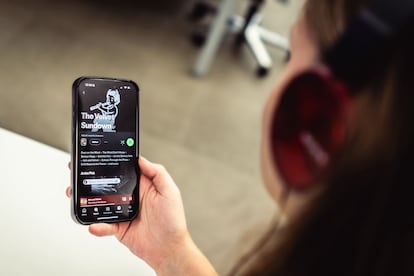Musical Crimes (4): AI on the attack, the new crime of the century

Strictly opinion pieces that reflect the author's unique style. These opinion pieces must be based on verified data and be respectful of individuals, even if their actions are criticized. All opinion columns by individuals outside the EL PAÍS editorial team will include, after the last line, a byline—no matter how well-known the author may be—indicating their position, title, political affiliation (if applicable), or main occupation, or any that is or was related to the topic addressed.

If you feel like you're struggling with your perception of reality, now there's another reason to worry: a large number of songs attributed to nonexistent artists are appearing online. These aren't just jokers' ideas; they're all about generating royalties . They've been created using artificial intelligence tools and can be deceptive if you don't listen closely.
Sometimes they also use the names of figures like Jakob Dylan, Jeff Tweedy, Teddy Thompson, Emily Portman, or Josh Kaufman (yes, Taylor Swift's collaborator). Nothing is sacred: they even fake the voice of Blaze Foley , a country singer who died in 1989. You'll tell me that Foley is unknown here, but it turns out he's acquired cult status in the US, thanks to Blaze , a 2018 biopic directed by Ethan Hawke.
You'll have noticed that no top-flight artists appear on that list. It makes sense: superstars have teams with sufficient legal firepower to prevent such abuses, protesting and/or threatening Spotify, Deezer , iTunes, and so on to remove these intruders, who disguise their nature with covers that mimic established visual aesthetics or photos of deceased stars.
The scam works like this. Given that nearly 100,000 songs are uploaded every day, streaming platforms lack sufficiently effective filters to contain the influx of suspicious material. Then there are phantom bands, like The Velvet Sundown , who have gone to the trouble of creating even portraits of the band. Surprisingly, they don't give interviews.
Once they've posted their fraudulent tracks, armies of bots spring into action, generating enough streams to earn them compensation. And who are the clever ones behind it? In the United States, Michael Smith, a musician from North Carolina who boasted to his friends about earning around $12 million, which he shared with the digital distributor that facilitated the scam, has been prosecuted. The character's nerve was fantastic: he boasted that his thing was "instant music." A conviction has already been issued in Denmark, although the name of the fraudster, who even transformed other people's songs to increase his income, placing himself among the country's top composers, has not been released. He has been sentenced to a year and a half in prison and had two million Danish kroner confiscated. Similar frauds are also being attempted in Spain, although nothing has gone wrong.
To detect these tricks, it's crucial to search the metadata for their digital identity. Record labels supposedly based in Indonesia or enigmatic names like Zyan Maliq Mahardika, who usually signs as a producer or composer and deserves a Grammy for his eclecticism, are discovered. He produces Christian songs as well as Satanic rock.
Stars have shown solidarity with their less fortunate colleagues. At least in the United Kingdom, where they have developed an initiative supported by Hans Zimmer , Annie Lennox , Yusuf Islam, Damon Albarn, Jamiroquai , Kate Bush and Max Richter , who have paid for a newspaper advertising campaign. This includes a digital album titled Is This What We Want? , featuring 12 recordings made in empty studios and venues. The titles of the tracks can be read in a single sentence: "The British government must not legalize the theft of music to benefit AI companies." Literally, it is an album of noise... one that would have delighted John Cage, the creator of the piece 4' 33" , where the performer remained silent during that time.
To put it simply, they're trying to prevent tech companies from using the internet's universal music library to educate their machines without worrying about copyright . The initiative doesn't seem to have moved the Department of Science, Innovation and Technology of Keir Starmer's government, which has taken refuge in the idea that any artist—and writers, who are also protesting—can demand that their music not be used for such purposes. True, but the blessed bureaucrats aren't considering how to enforce this veto against the thousands of companies accustomed to ignoring their rights holders.
EL PAÍS


%3Aformat(jpg)%3Aquality(99)%3Awatermark(f.elconfidencial.com%2Ffile%2Fbae%2Feea%2Ffde%2Fbaeeeafde1b3229287b0c008f7602058.png%2C0%2C275%2C1)%2Ff.elconfidencial.com%2Foriginal%2Fd99%2Fba0%2Fdd7%2Fd99ba0dd7cc423cf51a5052a76bf355f.jpg&w=1280&q=100)


